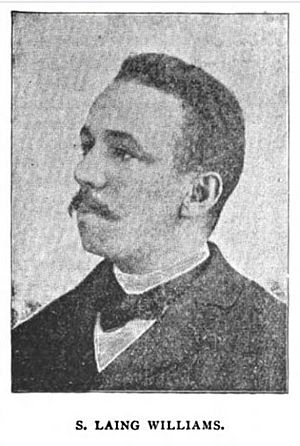Samuel Laing Williams facts for kids
Samuel Laing Williams (born January 10, 1857 – died December 21, 1921) was a very important person in American history. He was the first African American to graduate from the Law School at George Washington University in Washington, D.C.. Back then, the university was called Columbian University.
For a short time, between 1865 and 1890, Columbian University allowed African American students into its law program. Samuel Williams might have been the very first African American student to join any program at the university when he applied in 1882. He faced some challenges from other students but eventually earned their respect, along with the teachers. He even won a top prize for his law paper! He earned his first law degree (LL.B.) in 1884 while also working for the United States government. He became a lawyer in Washington, D.C., in 1885 and then earned another advanced law degree (LL.M.) that same year.
During this time, only three other African American students are known to have attended Columbian University Law School. Their names were Robert Bruce Bagby from Indiana, Theodore H. Greene from Mississippi, and George Langhorne Pryor from Virginia. Sadly, the university stopped admitting African American students soon after this period. George Washington University did not allow African American students again until 1954. This was after its law school joined with another law school that had already stopped separating students by race.
Early Life and Education
Samuel Williams was born in Savannah, Georgia. He was born sometime between 1854 and 1859. His mother was an African American woman named Nancy, and his father was an English man whose name is not known. One record says he was born on January 10, 1857.
We don't know much about his early childhood. By 1870, he was living in Chicago with David and Ann Laing, who were from England. He was listed as "Samuel Williams" on the census, but he later added "Laing" to his name. He moved with the Laings to Columbiaville, Michigan, where David Laing started a metal factory.
Samuel Williams went to the University of Michigan in 1877. He graduated in 1881 with a bachelor's degree. For a short time, he moved to Greensboro, Alabama, to teach at the Tullibody Academy. This was a private school for African American boys. After that, he moved to Washington, D.C. There, he worked for the United States Pension Office, helping to decide who should receive government pensions. Soon after, he started studying law at Columbian University.
Family and Community Work
While he was in law school, Samuel Williams met Frances "Fannie" Barrier (1855–1944). She was an African American teacher living in Washington, D.C. Fannie became a famous social activist, speaker, and journalist. She worked hard for social justice, civil rights, education, and job opportunities, especially for black women.
Samuel Williams moved back to Chicago in 1885, but he kept visiting Fannie in Washington. They got married at her parents' home in Brockport, New York, on April 20, 1887. They had celebrations in Washington and then moved to Chicago. There, they became important leaders in the African American community.
The Williamses were friends with many black activists, including Frederick Douglass and Booker T. Washington. They also knew white reformers like Jane Addams and Mary McDowell. They even convinced a wealthy businessman, Philip D. Armour, to help fund Provident Hospital. This hospital had both black and white staff and patients. It also had a nursing school for African American women.
Legal Career and Legacy
Samuel Williams worked as a lawyer for the Chicago branch of the NAACP. He served as the Vice President of the NAACP in 1914. He also worked as an Assistant U.S. District Attorney in Chicago during the presidencies of Theodore Roosevelt and William Howard Taft.
Samuel Williams was known as one of the best African American lawyers in the country. Many people thought he was a brilliant speaker. He passed away in Chicago on December 21, 1921. His work helped pave the way for future generations.
 | DeHart Hubbard |
 | Wilma Rudolph |
 | Jesse Owens |
 | Jackie Joyner-Kersee |
 | Major Taylor |


